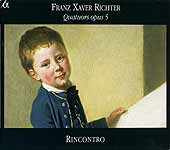Though Moravian composer Franz Xaver Richter was quite prolific during his long career, recordings of his music have been very few. Listening to these three well-crafted though creatively wanting string quartets composed during Richter’s final days in Mannheim, it’s not difficult to figure out why. All are based essentially on conservative models reliant on well-worn contrapuntal techniques instilled early on by Richter’s teacher Johann Fux. There are some near-ravishing moments, particularly in the more spirited outer movements, that are reminiscent of, say, a good Haydn imitator. Still, and despite the crack virtuosity of the ensemble Rincontro (named after the finale of Richter’s First quartet), this is largely uninspired stuff. Following each quartet Rincontro performs a brief contrapuntal study by Mozart. As usual Alpha’s presentation, documentation, and sound are second to none, but the musical interest just isn’t there.
































